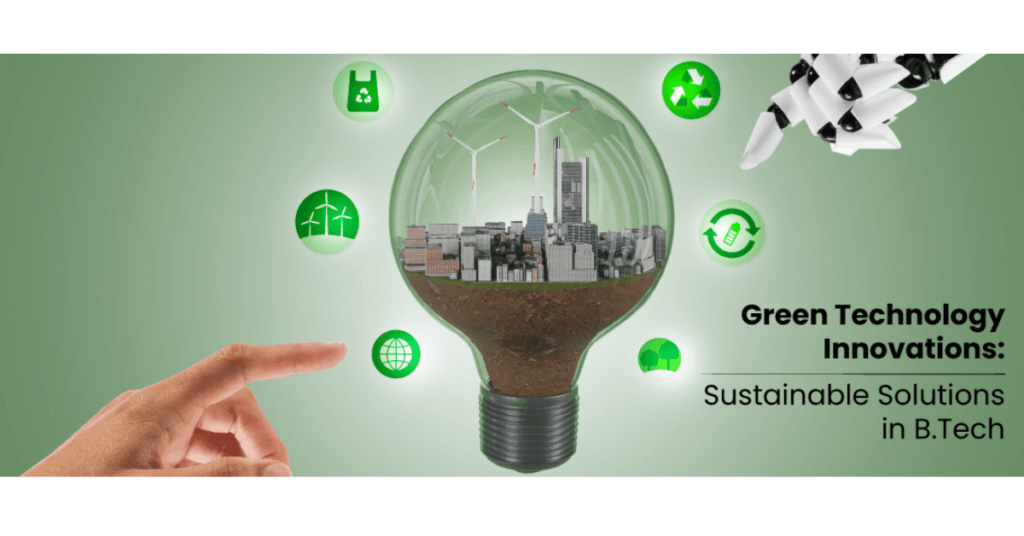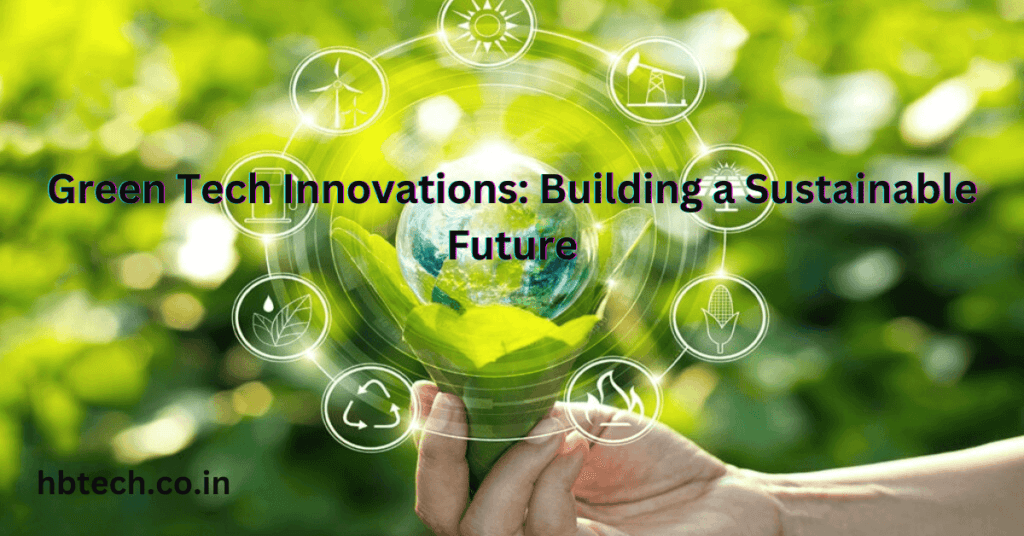
The push for green technology is growing, and it’s not hard to see why. Climate change, pollution , and resource depletion are prompting industries, governments, and individuals to seek eco-friendly solutions. “Green tech” refers to technologies that aim to reduce our environmental impact, covering everything from renewable energy to waste reduction and sustainable farming. Let ’s explore some of the most promising green tech innovations making a difference today and helping us move toward a more sustainable future.
Breakthroughs in Renewable Energy
New Developments in Solar and Wind Power
Solar and wind energy have been at the forefront of renewable energy. , and advancements are making them more effective and accessible. For instance, new “perovskite” solar cells are cheaper and more efficient to produce than traditional silicon ones. This innovation could make solar power affordable for more communities worldwide. Floating wind farms, such as those launched off Norway ‘s coast, allow countries with limited land to harness wind energy in open waters.
Ocean-Based Energy Sources
Marine technologies like tidal and wave energy are also emerging, capturing the natural power of ocean currents. Eco-friendly turbines in hydropower systems help to generate electricity while minimizing harm to aquatic life. These innovations are expanding the ways we can tap into renewable energy in diverse environments,
Battery and Energy Storage Advancements
As renewable energy grows, we need better ways to store it to ensure steady supply. Traditional lithium-ion batteries are common, but they have limits, including environmental concerns around mining and disposal. Enter new solutions like solid-state batteries and flow batteries. Solid-state batteries are longer-lasting and more stable, while flow batteries use liquid electrolytes for large-scale energy storage, making them ideal for renewable energy grids.
Companies are also repurposing used electric vehicle batteries , creating a “second life” for these batteries in energy storage systems. This approach helps reduce waste and extends the lifespan of valuable materials.
Eco-Friendly Building and Construction Technology
The construction industry contributes a significant amount of carbon emissions, both from material production and the buildings themselves. Innovative green construction methods are now emphasizing sustainable materials and energy-efficient design.
Sustainable Building Materials
Materials like mycelium (made from mushroom roots) and hempcrete (a hemp-based alternative to concrete) are becoming popular for their low environmental impact. Carbon-capturing concrete, which absorbs CO ₂ during the curing process, also shows promise as a cleaner option than traditional concrete.
Energy-Efficient Building Design
Green buildings use systems like smart thermostats, solar panels, and water recycling to reduce energy use and resource waste. Innovations like smart glass windows, which change transparency based on sunlight to regulate indoor temperatures, are making buildings even more efficient. Paired with advanced HVAC systems, these innovations help buildings achieve energy neutrality or even contribute energy back to the grid.
Sustainable Agriculture and Food Tech
Agriculture has a large environmental footprint due to land, water, and methane emissions from livestock. Green tech is helping to make farming more sustainable through smarter practices and innovative solutions.
Vertical Farming and Hydroponics
Vertical farming and hydroponics are reshaping agriculture by using less water and land. These systems grow crops in vertically stacked layers or without soil, using up to 90% less water and allowing year-round production in urban spaces. This method reduces the need for land and minimizes the carbon footprint of transporting food.
Lab-Grown Meat Alternatives
Lab-grown or cultured meat is another growing area in sustainable food tech. By cultivating meat cells in labs instead of relying on livestock, this method can help reduce methane emissions and preserve land and water resources. Many companies are working to make lab-grown meat available at scale , providing a more sustainable way to enjoy animal-based products.
Water Conservation Technologies
With water scarcity affecting many regions, green tech is focusing on efficient water management and conservation.
Atmospheric Water Generators (AWGs)
AWGs are devices that extract moisture from the air and turn it into clean drinking water. They offer a reliable, sustainable water source in regions facing drought or water shortages, reducing dependence on traditional water sources.
Smart Irrigation Systems
Smart irrigation systems use sensors and data analytics to optimize water use in farming. By monitoring soil moisture and weather conditions, these systems adjust water levels to avoid waste , helping farmers conserve water while maintaining healthy crops.
Waste Management and the Circular Economy
Moving toward a circular economy model, where products are reused or recycled, is essential for sustainability. The goal is to reduce waste by giving materials a second life instead of discarding them.
Innovative Recycling Technologies
One such innovation is chemical recycling, which breaks down plastics to their original compounds, allowing for high-quality recycling without degrading materials. AI -driven sorting systems in recycling plants also improve efficiency, helping separate materials more accurately and increasing recycling rates.
Biodegradable and Compostable Packaging
Many companies are turning to biodegradable packaging made from natural materials like cornstarch, algae, and even seaweed. Unlike traditional plastics , these materials can break down naturally, reducing pollution and waste in landfills.
These green tech innovations are helping us tackle critical environmental issues and create a more sustainable world. From renewable energy to eco-friendly farming and waste management, green technology is guiding us toward a future where we can grow, build, and thrive while protecting our planet.
The journey to a sustainable future is one that we all share. Embracing these technologies, supporting green initiatives, and making eco-conscious choices can bring us closer to a healthier, greener world for future generations.
Frequently Asked Questions(FAQs)
What is green technology, and why is it important?
Green technology, or “green tech,” refers to innovative technologies designed to minimize environmental impact. It’s essential because it offers sustainable solutions to combat climate change, reduce pollution, conserve resources, and create a more eco-friendly future.
What are the latest advancements in renewable energy?
Recent advancements include perovskite solar cells, which are more affordable and efficient than traditional solar cells, and floating wind farms that allow countries to harness wind energy offshore. Other innovations like tidal and wave energy are emerging, tapping into the ocean’s power as a renewable energy source.
What sustainable materials are used in green construction?
Green construction materials include mycelium (made from mushroom roots), hempcrete (a sustainable concrete alternative), and carbon-capturing concrete that absorbs CO₂ during curing. These materials reduce carbon emissions and make construction more eco-friendly.
How does water conservation technology work?
Water conservation tech includes devices like atmospheric water generators (AWGs), which capture moisture from the air to create clean drinking water. Additionally, smart irrigation systems use sensors to monitor soil and weather, optimizing water use and reducing waste in agriculture.
What is the circular economy, and how does it relate to waste management?
The circular economy aims to minimize waste by reusing, recycling, or repurposing materials rather than discarding them. Innovations like chemical recycling and biodegradable packaging help reduce pollution, support resource conservation, and promote more sustainable production cycles.
How can green tech help individuals contribute to sustainability?
Individuals can support sustainability by adopting green tech solutions like solar panels, energy-efficient appliances, and sustainable transportation options. Supporting companies and products focused on reducing environmental impact also plays a significant role in building a sustainable future.









